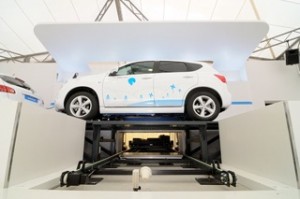One of the most interesting electric car initiatives so far is about to start, first in Israel, then, a little later, in Denmark.
From from this summer people will be able to buy a purpose-built Renault electric car with a range of about 100 miles. When the battery is running low, they simply drive into a service station and have it swapped, in a few minutes, for a fully charged one.
The man behind this radical scheme, the Better Place initiative, is Shai Agassi, who started appearing about four years ago on lists of technology figures to watch.
At first Agassi’s idea seemed a very good one, at least in the abstract. Then it began to sound a bit fanciful. After a century of owning their own vehicles, drivers would not be quite in control here. They won’t actually own the batteries in their own cars. Instead they would take out a service agreement and pay according to mileage.
The idea is for them to pull into a Better Place station along the highway anywhere in Israel, where a speedy team of garage hands whip out the car’s depleted battery and replace it with a fully charged one in a matter of minutes.
Now the plan seems to make a lot of sense again, with many prospective electric car buyers still put off by “range anxiety”, the idea of running out of juice in their electric vehicle (EV) in the middle of nowhere.
Better Place’s reassuringly supportive network of battery-replacement-on-demand stations might just be the answer, especially when the promise is to change the battery in roughly the same time as it would take to fill the car with a tank of petrol. If it had a tank.
Finding the battery “service stations” will be simple. An in-car information panel on the dashboard will tell drivers how far away the nearest recharging point is, even how many people are waiting there to have a battery changed.
Will Israel’s Electric Cars Change the World?, asks Time Magazine in an article dated April 26, 2011. Agassi believe they will. Time quotes him thus: “Within less than this decade the No. 1–selling car in the world will be the electric car. It’s the biggest financial opportunity the world has ever seen. We’re seeing a $10 trillion shift in an industry in less than a decade. It’s the Internet, and add another zero.”
Renault is building a car for the program in Turkey, the Renault Fluence Z.E. (Zero Emission), a four-door sedan that looks like any other car, except that it’s designed to have its battery easily removed and replaced on a special ramp–see photo.
Israeli drivers can order the vehicle from this summer. The Better Place programme rolls out later this year (2011).
Better Place has been been conducting out all sorts of tests, driving around Israel with empty electric cars, cars full of fat people and cars full of thin people to test battery range. Motorists should be able to drive anywhere in Israel without fear of being stranded. Denmark, a similarly sized country, will start the program shortly afterwards.
A final word from the optimistic Agassi. “ We have digitised the most expensive molecule on the planet,” he says. “We’ve digitized oil.”

